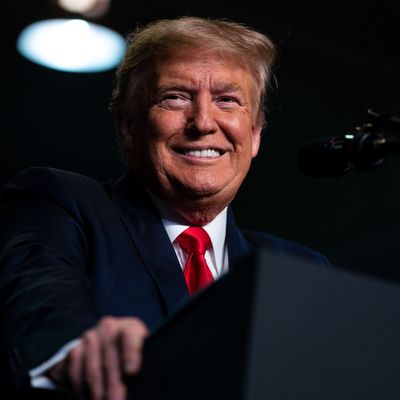
One of the stone verities of national life over the last three years, right up there with regular California wildfires and a dysfunctional Congress, has been the stability of Donald J. Trump’s job-approval assessments by the public. Yes, they sometimes went up well into the low 40s, and sometimes went down into the mid-to-high 30s, depending mostly on the presence or absence of conspicuously bizarre and destructive Trump behavior. But as Geoffrey Skelley noted in March last year, Trump has stood out from past presidents in this respect:
Trump’s approval rating has the least variation of any post–World War II president. Granted, Trump hasn’t yet served a full term, but changes in his approval rating have been remarkably small.
That may be changing, and at the perfect time for Trump. His average job-approval rating according to RealClearPolitics had but rarely drifted just above 45 percent since Inauguration Day. Today, it stands at 46 percent. And you can’t blame that on some unusual mix of pro-Trump surveys like Rasmussen or The Hill–HarrisX. The venerable Gallup Poll has for two straight months placed the president’s job-approval number at 49 percent, far above his average Gallup rating of 40 percent over the course of his presidency.
RCP does not weigh job-approval polls for reliability and partisan bias, so sometimes its numbers are suspect. But FiveThirtyEight conducts multiple adjustments to boost accuracy, and its job-approval ratings for Trump are also spiking in the direction of previously unreached levels. It’s at 44.3 percent utilizing all polls, and at 45.9 percent if you limit the sample to those of registered voters or likely voters (as opposed to “all adults”). Both these numbers are highs for Trump since early 2017.
Beyond the fact that assessments of Trump are suddenly rising after years of stagnation, what’s notable is that he’s getting into the territory normally associated with a president who can get reelected. That skillful gravedigger for Democratic hopes, the New York Times’ Nate Cohn, put it all together in a spin most favorable to the incumbent:
The comparison to which Cohn is likely alluding is, ironically, Barack Obama, whose job-approval rating also began to drift upward just before he faced voters for a second time in 2012. A year out, his job-approval rating was at 43 percent (per Gallup), much where Trump’s was in November 2019. By Election Day 2012, it was up to 52 percent, and he won 51 percent of the popular vote.
The most commonly cited explanation for why Trump’s approval rating might be spiking, of course, is that Greatest Economy Ever he keeps boasting about. Multiple public-opinion outlets are reporting that optimism about the economy is on the rise, and, along with it, confidence in Trump’s stewardship of the economy (despite the lack of evidence that his policies have much to do with the steady job growth that began when Obama was in office).
But Trump’s overall job-approval rating — by all accounts the measurement most closely associated with reelection prospects — has long lagged the positive economic numbers. Indeed, Ron Brownstein has capably shown that the key to his reelection or defeat may be a group of voters who basically can’t stand Trump personally, but like the economy for which he claims all credit. Is anything happening with the economy now that should flip these voters into enthusiasm for the president? Or is something else going on?
Another theory is that Trump’s impeachment and acquittal has revved up his MAGA base to a level of excitement associated with some sort of massive social movement, boosting the likelihood that his fans will show up in November to a near certainty as they seek to consummate the destruction of POTUS’ evil persecutors. And in that explanation lies the possibility of some distortion in the polling, since people excited about their politics are more likely to respond to polls to a degree that doesn’t necessarily correspond to higher voting turnout. There’s even a hint of that in the Gallup data that looks so good for Trump:
Gallup has observed an increase in the percentage of Americans identifying as Republicans (32% in the past two surveys, up from 28% in the prior two surveys), along with a decline in the percentage identifying as independents (41%, down from 43%) and Democrats (27%, down from 28%).
So are Americans drifting into the Republican Party with its agenda of “entitlement reform,” militarism, nativism, climate-change denial, and unlimited presidential authority? Or are Trump’s bravos just skewing response rates?
It’s too early to know. For one thing, Trump has a habit of stepping on his best reelection messages with destructive behavior, such as his decision to throw a temper tantrum in late 2018 over border-wall money and shut down the federal government, which temporarily tanked his approval ratings. His sense of liberation in surviving impeachment could lead him to do really stupid things; would-be tyrants tend that way. But without question, he’s in better shape from the point of view of basic popularity than he has been for big stretches of his presidency, and if his numbers do improve, he may need to worry about his arrogance breeding complacency and overconfidence, matching Hillary Clinton’s in 2016.






























